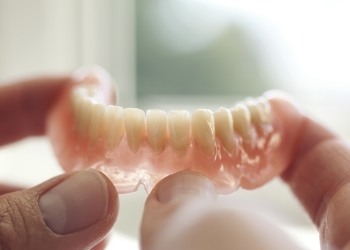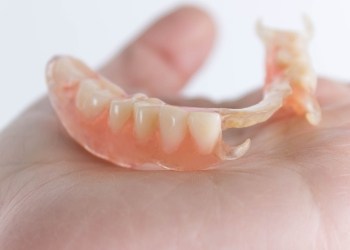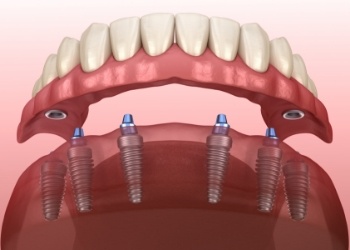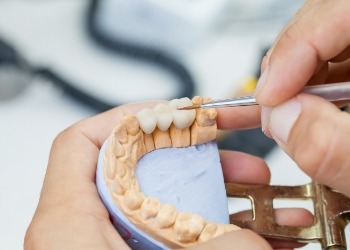Dentures in Gorham
You Deserve To Smile Without Reservation

You deserve a life filled with joy, where eating your favorite foods and sharing laughter with friends comes naturally. Losing even one tooth can feel devastating, but the loss of several or an entire arch can greatly impact your daily life. Suddenly, activities like eating, speaking, and smiling become more challenging.
At Morgan Dental Care, we picture a world where everyone enjoys a reliable and confident smile. Explore your options for dentures with our team who understands the importance of a healthy smile.
Schedule your FREE consultation at our Gorham office today, and let's start the journey towards your new smile.
Why Choose Morgan Dental Care for Dentures?
- Implant-Retained Dentures Available
- FREE 1st Visits & 2nd Opinions
- 100% Customization – No “One Size Fits All”
Who’s a Good Candidate for Dentures?

Dentures are a tried-and-true method of tooth replacement. To this day, they’re one of the most popular solutions for missing teeth! Whether you’re missing one or more teeth, nearly everyone is a good candidate for dentures. Your prosthetic teeth will be custom-made to fit your smile perfectly, ensuring you get the best results possible. Of course, the only way to know for sure if you’re eligible is by scheduling a consultation with our team at Morgan Dental Care. Even if dentures aren’t a viable option for you, we may be able to help by restoring the health of your jawbone structure and gumline.
Effects of Missing Teeth
First and foremost, it’s important to understand what causes missing teeth. According to the American College of Prosthodontists, some common reasons include tooth decay, gum disease, and trauma. These oral health issues can lead to several complications down the line, such as tooth loss.
If you fail to replace the gaps in your smile, the jawbone can shrink due to a lack of stimulation of blood flow. This can cause the bone tissue to weaken, increasing the chances of further tooth loss. It can also lead to problems like facial sagging, difficulty eating, trouble speaking, and lower self-confidence.
What Qualifies You for Dentures?
You’ll be happy to know that most people who suffer from extensive tooth loss are eligible to receive dentures. These tried-and-true prosthetics have been around for many years, helping patients eat, speak, and smile with confidence.
We typically recommend dentures to patients with:
- Significant tooth loss
- Sensitive teeth
- Tooth decay
- Sufficient healthy gum tissue and jawbone
- A commitment to their dental health routine
Alternative Tooth-Replacement Options
If you don’t qualify for dentures, you can explore alternative tooth-replacement solutions. Some of these options include:
- Dental Bridges: These custom-made restorations are ideal for patients missing one or several teeth in a row. However, you must have nearby healthy teeth on either side of the gap to support the bridge.
- Dental Implants: For more durability, we can insert dental implants directly into your jawbone to support your new teeth. Of course, this option requires a strong facial structure and sufficient bone density. Although it’s a bit more costly than other options, you can enjoy your results for a lifetime.
Learn More About Dental Bridges
Learn More About Dental Implants
Traditional Full Dentures

When an entire arch of natural teeth has been lost, a traditional full denture can provide comprehensive coverage when patients need it most. This style of prosthetic is designed to sit on top of the natural gum line and stay in place through natural suction. Some patients prefer to use a little extra denture adhesive for additional stability, but this shouldn’t be necessary. Your full denture will be removable and should be taken out of the mouth while sleeping and when practicing oral hygiene.
Traditional Partial Dentures

If the patient has lost certain teeth along a single arch of the mouth and wants to preserve the natural, healthy structure that remains, a partial denture is the right choice. This style of prosthetic will attach into place with the help of brackets and/or clasps, filling these gaps in a lifelike and functional manner. Like full dentures, partials are designed to be removable.
Implant Dentures

At Morgan Dental Care, we strongly recommend that our patients consider outfitting their new or existing dentures with state-of-the-art dental implants. Because implants are placed directly within the jawbone, they support oral health and also prevent the gradual deterioration of the jawbone over time, which is often what leads to a “hunched” facial appearance in elderly people. Once anchored in place over implants, your new “teeth” will also feel more stable, provide a wider range of functions, and last longer without the need for repairs and replacements.
How Dentures Are Made

Ever wondered about the personalized process behind your dentures? Learning more about their construction and the materials involved adds an extra layer of appreciation to your unique smile. Keep reading to uncover the journey that leads to the final, dazzling results!
What Are Dentures Made Of?
Dentures consist of two key components: the denture base and the teeth. Let's break down what each part is composed of:
- Denture Base – This forms the essential structure that provides support for the artificial teeth. It can be crafted from various materials, including acrylic, nylon, or resin. Full dentures primarily use acrylic due to their ability to closely mimic your natural gum tissue. Partial dentures may incorporate metal clips along with an acrylic base, while in some instances, nylon is utilized instead of acrylic.
- Artificial Teeth – These are affixed to the denture base and serve as replacement teeth. They are typically constructed from either resin or porcelain, as both offer a natural appearance. However, porcelain is the preferred choice due to its remarkable likeness to natural teeth in both look and feel, coupled with its exceptional durability.
The Denture Creation Process
Each denture undergoes a meticulous, multi-step process tailored to the patient’s mouth. Our team initiates the procedure by taking precise impressions of the upper and lower gums using a special paste. These impressions form the basis for crafting a plaster model that perfectly mirrors the size and shape of your mouth. This model serves as a blueprint to ensure the final denture aligns seamlessly with your unique smile.
Next, the plaster model is dispatched to a dental laboratory where the dentures are created. The process kicks off with the fabrication of a wax replica of your gumline. Artificial teeth are then affixed in position, and an articulator (a mechanical device) is employed to secure the teeth with wax. The technician makes final adjustments to ensure a precise fit.
The wax dentures are returned to the dental office for a fitting. Upon approval, they are sent back to the dental lab for the final phase. This involves a technique known as "boiling" the dentures. The dentures are placed in a flask, surrounded by plaster to maintain their form, and submerged in hot water to eliminate the wax components. Holes are then made into the teeth, and acrylic is injected into the flask to replace the wax.
Careful removal of the plaster from the denture is executed using specialized tools. Afterward, the dentures undergo an ultrasonic bath to eliminate any lingering traces of plaster. Excess acrylic is trimmed from the denture, and the restoration is polished to achieve a flawless finish.
Once the dentures are prepared, a return visit to the office is scheduled for a fitting. Any necessary adjustments are made to ensure optimal functionality and comfort.
Adjusting to Your New Dentures
Initially, you may experience some minor discomfort when you first start wearing new dentures. Rest assured – this is entirely temporary. As time goes on, your mouth will gradually adapt to the dentures, and they will begin to feel much like your natural teeth. Throughout this adjustment phase, it's advisable to opt for softer foods and engage in facial muscle exercises. Should any discomfort persist beyond the expected period, please don't hesitate to reach out to us.
Understanding the Cost of Dentures

Just like any restoration, the cost of dentures varies from person to person. During your consultation with us, we will take the time to discuss your unique case and exactly what you can expect to pay for your new dentures. In the meantime, here are a few things to consider so you can better understand what determines the cost of dentures in Gorham.
Factors That Affect the Cost of Dentures
Three main factors will influence the cost of your dentures:
- The preparatory work that you require before getting dentures, like tooth extractions and gum disease therapy.
- The materials that are used to create your dentures. This can include porcelain or acrylic.
- The number of teeth that need to be replaced.
Always keep in mind that just because a denture is cheaper doesn’t mean that it is equal or better. Budget dentures tend to break more easily and require replacement much sooner than you would expect. When it comes to your oral health, quality dentures are a worthwhile investment.
Are Implant Dentures More Expensive?
Implant dentures are more expensive than traditional dentures. This is because they require oral surgery and the placement of multiple dental implants. However, they do have several advantages that you can’t experience with traditional dentures. Implant dentures are more stable and longer lasting. They also help to prevent bone loss from occurring in the future.
Does Dental Insurance Cover Dentures?
In most dental plans, you can expect some level of coverage, usually up to 50%, for dentures, but this will vary depending on your provider. Our practice is happy to accept a long list of dental insurance plans, and we will even file your claim on your behalf to save you the hassle of doing it yourself. This way, we can make sure you are getting the most out of your benefits.
Other Options for Making Dentures Affordable
We have several different payment options to make getting your restoration as affordable as possible:
- Prepayment Discount: For treatment plans over $250 that are paid in full when making the appointment at least two weeks before your scheduled visit, you are given a discount.
- CareCredit: We work with CareCredit, a third-party financial company, so you can break your payments into manageable monthly installments with little to no interest.
- DenVantage: With DenVantage, you pay one flat annual fee, and you’re instantly covered for the entire year, gaining access to discounts on a variety of treatments, including dentures. You won’t need to deal with claim forms, deductibles, monthly premiums, or annual maximums.
The best way to know exactly what you can expect to pay for your dentures is by scheduling a consultation with us. We are eager to help you get your smile back!
The Benefits of Dentures

Tooth loss can take much away from your daily oral habits, such as eating and speaking comfortably. The good news is that you can easily regain all of this by receiving custom-designed and natural-looking dentures. This tooth-replacement option has helped countless patients rebuild their missing pearly whites and enjoy a better overall quality of life. Here are the various benefits you can expect to appreciate with dentures.
Psychological Benefits
Those who’ve lost most of their pearly whites often struggle with a wider range of issues than just tooth loss. In many cases, they may experience downsides to their self-esteem, feeling insecure about the way they look, which can make them avoid engaging in social events. They might also have a higher risk of struggling with sadness and depression. By replacing your missing teeth with dentures, you can avoid these complications while boosting your confidence. You also won’t have to worry as much about problems with your speech, chewing ability, and more.
Clearer Enunciation
It can be quite difficult to enunciate your words clearly while missing some of your teeth. This is mostly because we use our tongues and lips with our teeth to say certain sounds, which can become more challenging if you don’t have all of your smile. With dentures, you’ll regain the structures in your mouth necessary for proper speech so you can articulate your words. It can take some time to get used to your dentures, but a little practice and time can go a long way.
Improves Nutrition
Certain foods can be much tougher to chew, including some healthy options like fruits, veggies, and lean proteins. Without the ability to properly bite down and grind your meals, you can end up struggling with issues like indigestion and malnutrition. By improving your chewing ability with dentures, you’ll be free to expand your dietary choices so that you can include more nutritious food options. Being able to eat healthier meals can also help improve your gum tissue as well as the rest of your mouth, reducing your chances of oral complications down the road.
Preserves Oral Health
Some patients may still have some of their natural teeth remaining after suffering from tooth loss. In many cases, the remainder can begin to shift out of position to fill in any gaps in a person’s smile, which can then lead to further tooth loss. Dentures can serve as placeholders to keep your other teeth from moving out of place. Your prosthetics can also help bear some of the pressures of chewing, reducing the wear and tear of your existing pearly whites.
Expands Opportunities
First impressions can be improved with a wide range of factors, including your smile. Being able to show off a full set of pearly whites can help boost your confidence as well as make others perceive you as more charismatic and attractive. Replacing missing teeth with dentures can easily do this for you, which in turn can expand your opportunities in both your social and professional settings!
Dentures Aftercare

Dentures are a fantastic way to totally transform your smile for the better. Not only can they restore the function of your smile by helping you process food, but they also create a bright, stain-resistant, and uniform grin. However, just like your natural teeth, they need proper care and maintenance to stay fresh and dazzling. At Morgan Dental Care, we provide prosthetics that last, but without a great aftercare routine, you could face costly relines and replacements. Continue reading below to learn how to properly care for your dentures to enhance their appearance and increase their longevity.
Removeable Dentures
Remove After Eating
Dentures should be removed after every meal and rinsed thoroughly with lukewarm water. This will help wash away plaque, bacteria, and excess food debris that could otherwise make your denture wearing experience uncomfortable. A word of caution: when you do rinse your prosthetics, don’t use hot water as it may warp or damage the base. If this happens, your dentures will no longer fit properly, causing a whole host of oral issues.
Clean Your Restoration
Just like natural teeth, dentures need to be brushed daily to look and feel their best.
Start by removing your dentures from your mouth to clean them. Next, use a mild colorless hand soap and a soft-bristled toothbrush to gently clean every surface of your prosthetics. During this process, it’s important to avoid regular toothpaste as it can be too abrasive and slowly wear down the artificial teeth.
Lastly, rinse off your dentures completely before putting them back into your mouth. Otherwise, place them in a container of cold water or denture solution to keep them moist and bacteria-free while you’re not wearing them.
Keep Your Dentures Safe
While your dentures are very durable when used properly, they can be fragile if dropped or left out. Spreading a soft towel over the counter of your sink when removing your dentures will prevent them from dropping and being damaged on the hard surface. Additionally, it’s important to keep them in a safe place out of the reach of children or pets and away from extreme heat. Following these guidelines will keep your dentures safe and unbroken.
Remove When You Sleep
It’s vital that you always remove your dentures before you go to sleep. While it may feel natural to keep them in, the base can restrict the circulation in your gums and cause irritation and inflammation. It also traps bacteria and food debris underneath them. Over time this can cause unpleasant odors, and gum disease, and increase your risk of pneumonia as you breathe in harmful germs.
Notice Changes
Keeping an eye on your dentures to notice small changes is just as important for their longevity as cleaning them. Pay close attention to how your mouth feels as you continue wearing your prosthetics. Sores, cuts, and other irritations may be a sign that your dentures aren’t fitting properly and need to be relined or replaced. If you see visible damage or experience any of these symptoms, give us a call. Our dentists can examine your dentures and recommend the best way to help you find relief.
Dentures FAQs
Getting dentures usually represents a big change in your life, and there are probably plenty of things that you’re uncertain about. During your free consultation, we encourage you to ask any questions you have about dentures, how they work, and what is going to happen during the process. The questions below are a few examples of things that our patients often ask when getting dentures for the first time; check to see if the answers you’re looking for are down below.
When Will I Get My Dentures After My Teeth Have Been Pulled?
Your gums will need to heal after an extraction; we will have to wait to place dentures until after the recovery process is complete. The wait time is usually between six to eight weeks, but this might vary depending on the kind of denture you get as well as your body’s personal healing capabilities. If your dentures are being anchored to dental implants, then it will be about four to six months before you receive your permanent new teeth; that is usually about the amount of time it will take for the implants to fuse with the bone tissue.
Will Getting Dentures Hurt?
If tooth extraction or implant surgery is part of the denture process, then you can expect some discomfort after the procedure, which you can usually control with pain medication. Usually, the soreness will improve after 5 days at most. As for the dentures themselves, they may irritate the soft tissues in your mouth somewhat, and they may feel uncomfortable for a few months while your mouth adjusts. (This adjustment period may last even longer if you are getting new dentures to replace old ones). Ultimately, any pain you experience should fade over time, and if it doesn’t, you need to call us right away to check for potential oral health issues or fitting problems.
Will Dentures Change the Shape of My Face?
If your dentures fit correctly, then they’ll change the shape of your face for the better. Facial muscles start to sag once there are no teeth to support them, giving your face an older, more shrunken appearance. Dentures can provide the support these muscles need and keep your face looking younger. However, if the dentures don’t fit correctly, the support they provide will suffer. That’s why we’re very particular about designing fully personalized dentures that fit perfectly on your gums.
Will I Still Be Able to Eat Steak with Dentures?
Steak is considered a prime example of food that is hard to chew with dentures, but it’s actually doable if you take the right steps first. First of all, you can choose easier-to-chew cuts like tenderloin that don’t contain tough connected tissues. The meat should always be thoroughly tenderized before being cooked. Always cut your steak into small pieces – the smaller the better. Finally, make sure your dentures are as stable as possible so that you can chew comfortably; using an adhesive can help them stay in place.
